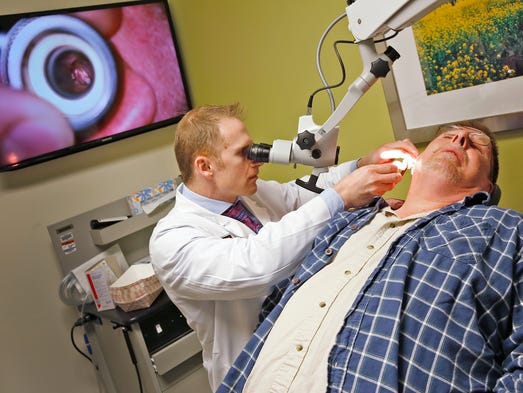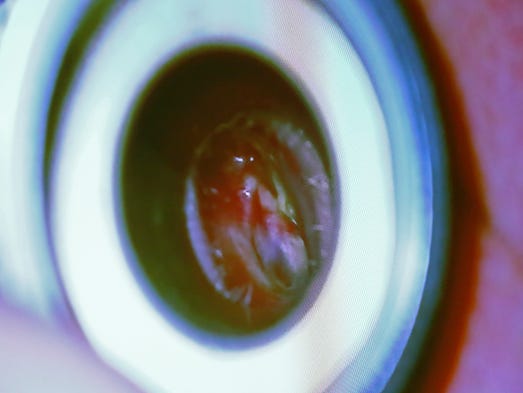Mark Hoffman of Akron, Ind., would wake up in the morning to find his pillow soaking wet. He would put a cotton ball in his ear to soak up the fluid and soon it would be saturated with liquid.
A decade passed before Hoffman, 53, was able find a doctor who could correctly diagnose the problem.
The verdict? In medical terms, it was a cerebrospinal fluid leak. Or, in terms that might make us laypeople wince, Hoffman had brain and spinal fluid oozing out of his right ear and even at times out of his right nostril.
The condition is becoming more common, said Dr. Rick Nelson, neurotologist at Indiana University Health here, who performs surgery to correct this problem.
Often Nelson can simply look at the fluid to confirm his suspicion that a person has a leak.
“It was dripping every 10 seconds. I used over 5,000 cotton balls in my ear. About every 30 to 45 minutes, you could squeeze it and fluid would be running out of the cotton ball.”
Mark Hoffman, Akron, Ind.
“When I look in the ear and in the ear tube, the fluid that comes out is more clear and it doesn’t look like an infection,” he said. “It kind of pulsates, like a heartbeat. If you suck it out, it will come out, like a leaky faucet.”
Spontaneous cerebrospinal fluid leaks occur when bone is lost in the shelf of bone between the brain and the ear, and a hole develops in the membrane bag that surrounds the brain, called the dura. Such leaks also can result from trauma.
Incidence of this condition has more than doubled in the past decade, Nelson said.
About 10 years ago, he performed two to four of these procedures every six to 12 months. Now, he does one to four such operations a month.
Some of the increase can be attributed to better diagnosis. As Hoffman learned, often doctors misidentify this condition, which tends to be more common in women than men and in those who are middle aged.
Doctors know that the rise in obesity may play a role, but they’re not exactly sure why.
Nelson suspects that another condition common in obese patients, obstructed sleep apnea, may be to blame.
People with obstructed sleep apnea stop breathing several times throughout the night, elevating the pressure in their heads each time. Over time, this elevated pressure may erode the bone and the spinal fluid can start to leak out of the ear, as happened in Hoffman’s case.
At first, the leak was so minor that Hoffman attributed it to water in his ear from a shower. When it got worse, he figured it was an ear infection.
“The reason we want to fix this (is) because of the risk of meningitis, and it’s super annoying to have the fluid.”
Dr. Rick Nelson, Indiana University Health
Then last year, he started losing hearing in his right ear. A doctor said Hoffman had damaged his mastoid bone and required surgery.
After that, his ear started leaking constantly.
“It was dripping every 10 seconds,” he said. “I used over 5,000 cotton balls in my ear. About every 30 to 45 minutes, you could squeeze it and fluid would be running out of the cotton ball.”
As Hoffman learned, the body maintains a never-ending supply of this fluid. Even people without leaks make and reabsorb spinal fluid about twice a day.
But leaks open the person to developing meningitis, a potentially fatal infection of the brain, Nelson said. About 15% to 20% of people who have a leak learn of the problem once they have been diagnosed with meningitis.
“That’s the reason we want to fix this because of the risk of meningitis, and it’s super annoying to have the fluid,” he said.
The only fix is a three-hour surgery in which Nelson repairs the bone with a piece of the patient’s skull and patches the dura with tissue taken from the muscle over the ear.
Leaks from trauma usually resolve on their own.
Hoffman had surgery in December. Since then, his hearing loss has continued.
Nevertheless, he said he's glad he had the procedure.
“I feel better since the surgery. It’s a relief,” he said. “No. 1, it’s not leaking anymore, and then you have to always worry about the brain fluid coming out of your ear.”


Dr. Rick Nelson, left, looks at Mark Hoffman's ear and ear drum during an appointment at the IU Health Neurotology ENT Clinic, Monday, May 1, 2017. Hoffman suffered from a spontaneous cerebral spinal fluid leak and Dr. Nelson diagnosed and operated on the condition. Kelly Wilkinson/IndyStar
Follow Shari Rudavsky on Twitter: @srudavsky

No comments:
Post a Comment